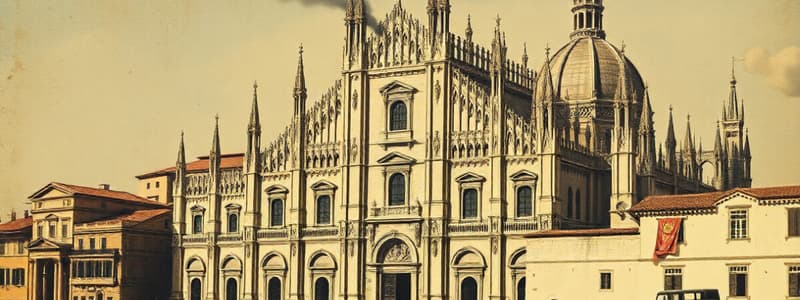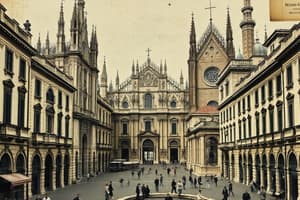Podcast
Questions and Answers
What event did the Edict of Milan formalize?
What event did the Edict of Milan formalize?
- The beginning of the Renaissance in Milan
- The establishment of the state church of the Roman Empire
- The unification of Italy
- The granting of legal status to Christians (correct)
Which two powerful families are noted for their influence in Milan during the Middle Ages?
Which two powerful families are noted for their influence in Milan during the Middle Ages?
- Visconti and Sforza (correct)
- Gonzaga and Este
- Medici and Borgia
- Orsini and Colonna
What architectural styles are reflected in the design of the Milan Cathedral?
What architectural styles are reflected in the design of the Milan Cathedral?
- Gothic and Neoclassical
- Renaissance and Baroque
- Perpendicular Gothic and Flamboyant Gothic (correct)
- Romanesque and Byzantine
What was the primary function of the Navigli canals when they were first constructed?
What was the primary function of the Navigli canals when they were first constructed?
In which century did construction of the Milan Cathedral begin?
In which century did construction of the Milan Cathedral begin?
Who financed the final details and decorations of the Milan Cathedral in the late 19th century?
Who financed the final details and decorations of the Milan Cathedral in the late 19th century?
What was a key administrative role of Milan in the 19th century?
What was a key administrative role of Milan in the 19th century?
How were the canals of the Navigli used for military purposes?
How were the canals of the Navigli used for military purposes?
Milan was established by the Romans in around 400 BC.
Milan was established by the Romans in around 400 BC.
The Edict of Milan was issued in February 313 by Emperor Constantine I.
The Edict of Milan was issued in February 313 by Emperor Constantine I.
The Navigli canals in Milan were initially constructed for military purposes only.
The Navigli canals in Milan were initially constructed for military purposes only.
The Milan Cathedral features influences from only one Gothic architectural style.
The Milan Cathedral features influences from only one Gothic architectural style.
Construction on the Milan Cathedral began in the 16th century.
Construction on the Milan Cathedral began in the 16th century.
The final details of the Milan Cathedral were completed under the orders of Napolean Bonaparte.
The final details of the Milan Cathedral were completed under the orders of Napolean Bonaparte.
Milan has always been a significant cultural and political center throughout its history.
Milan has always been a significant cultural and political center throughout its history.
The spires and statues on the Milan Cathedral are only found on its interior.
The spires and statues on the Milan Cathedral are only found on its interior.
Milan was founded around 400 BC by the Celts.
Milan was founded around 400 BC by the Celts.
The Edict of Milan established Christianity as the state religion of the Roman Empire.
The Edict of Milan established Christianity as the state religion of the Roman Empire.
The Navigli canals were primarily built for irrigation and trade.
The Navigli canals were primarily built for irrigation and trade.
Napoleon Bonaparte financed the final construction phases of the Milan Cathedral in the 19th century.
Napoleon Bonaparte financed the final construction phases of the Milan Cathedral in the 19th century.
Milan Cathedral is faced with blue-flecked marble from the nearby Ossola Valley.
Milan Cathedral is faced with blue-flecked marble from the nearby Ossola Valley.
Milan has only been influenced by the Visconti family during the Middle Ages.
Milan has only been influenced by the Visconti family during the Middle Ages.
The Milan Cathedral is one of the largest churches in the world.
The Milan Cathedral is one of the largest churches in the world.
The architectural style of Milan Cathedral only shows influences from Flamboyant Gothic style.
The architectural style of Milan Cathedral only shows influences from Flamboyant Gothic style.
Flashcards
Edict of Milan
Edict of Milan
A decree issued in 313 CE by Roman Emperors Constantine I and Licinius granting legal status to Christians, ending persecution.
Milan's founding
Milan's founding
Milan was founded around 400 BC by Celts, later incorporated into the Roman Empire.
Milan Cathedral
Milan Cathedral
A large church in Milan, exhibiting a combination of Perpendicular Gothic and Flamboyant Gothic styles; a famous building.
Navigli canals (Milan)
Navigli canals (Milan)
Signup and view all the flashcards
Visconti and Sforza families
Visconti and Sforza families
Signup and view all the flashcards
Perpendicular Gothic style
Perpendicular Gothic style
Signup and view all the flashcards
Flamboyant Gothic
Flamboyant Gothic
Signup and view all the flashcards
Milan's Renaissance role
Milan's Renaissance role
Signup and view all the flashcards
Milan's Medieval Power
Milan's Medieval Power
Signup and view all the flashcards
Milan's Renaissance
Milan's Renaissance
Signup and view all the flashcards
Milan's Invasions
Milan's Invasions
Signup and view all the flashcards
Milan's Unification Role
Milan's Unification Role
Signup and view all the flashcards
Milan's Navigli: What were they?
Milan's Navigli: What were they?
Signup and view all the flashcards
Milan Cathedral: Style
Milan Cathedral: Style
Signup and view all the flashcards
What was the purpose of Milan's Navigli?
What was the purpose of Milan's Navigli?
Signup and view all the flashcards
Milan Cathedral's Exterior
Milan Cathedral's Exterior
Signup and view all the flashcards
Study Notes
Early History of Milan
- Founded by Celts around 400 BC, later conquered by Romans
- Mediolanum (Milan) site of the Edict of Milan in 313 AD
- Edict granted legal status to Christians, though it did not establish Christianity as the Roman Empire's state religion (380 AD)
Medieval and Renaissance Milan
- Rose to prominence during the Middle Ages under the Visconti and Sforza families
- Became a center of art, culture, and politics
- Important center during the Renaissance, home to artists like Leonardo da Vinci
- Faced numerous invasions and occupations (Spanish, Austrians, Napoleon)
Milan's Canals and the Cathedral
- Extensive canal system (Navigli) began in the late 1100s for irrigation and transportation.
- Naviglio Grande reached Milan by mid-1200s, enabling trade between Switzerland and northern Italy. Also used for military defense.
- Milan Cathedral construction began in 1386, financed and partially designed by Napolean Bonaparte.
- Canal assisted in moving building materials for the cathedral.
- One of the world's largest churches, combining English Perpendicular Gothic and French/Spanish Flamboyant Gothic styles.
Milan Cathedral's Features
- Constructed with pink-flecked marble from the Ossola Valley.
- Decorated with spires, statues, and intricate sculptures, both inside and out.
- Extensive use of buttresses for structural stability.
- Notable for its "forest" of pinnacles and spires, offering city views.
- Architectural details designed not only for visual appeal but also for religious purposes.
Studying That Suits You
Use AI to generate personalized quizzes and flashcards to suit your learning preferences.




